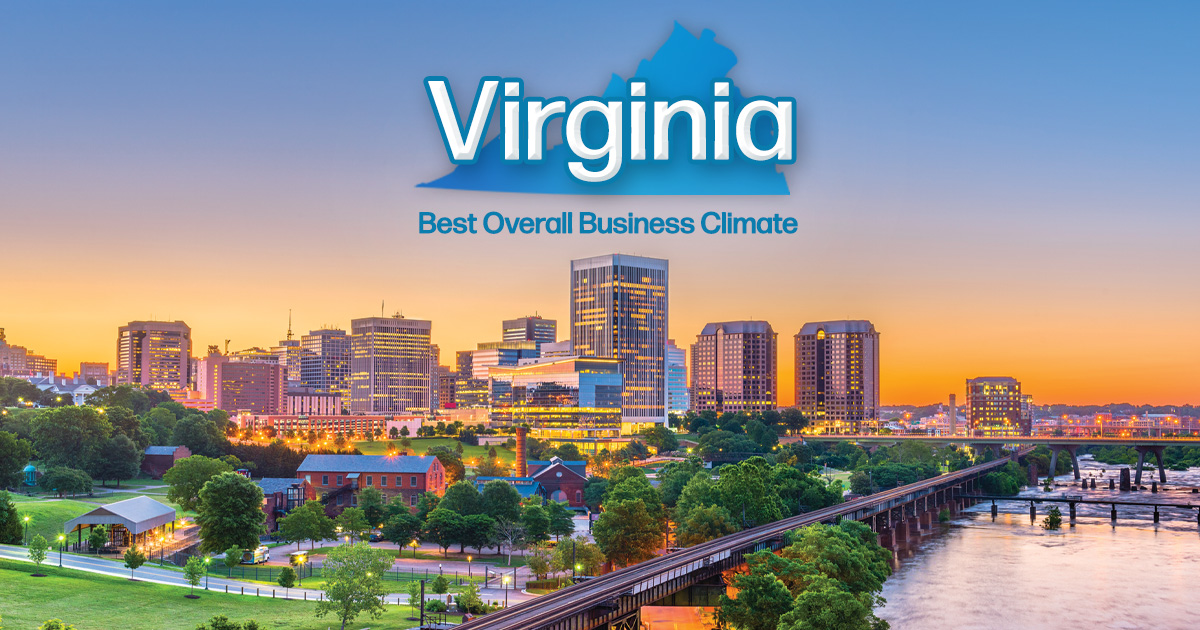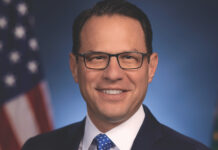 By Seth Mendelson
By Seth Mendelson
From the January/February 2022 Issue
What makes Virginia so special from a business point of view? To begin with, it may be the commonwealth’s location, adjacent to the nation’s capital and flush against the Atlantic Ocean. Or it might be Virginia’s world-class transportation and well-developed infrastructure that can quickly get product from its growing and respected seaports, factories and farms to nearby key economic hubs in the northeast, midwest and southeast regions of the country.
Or it could be its strong labor pool and many first-class universities, annually producing thousands of new graduates ready for the challenges of the mid-21st century. Or perhaps it is a combination of the Old Dominion’s high standard of living and business-friendly regulations that make it easy to move to the commonwealth and easier to set up shop there.
The answer, of course, is all of the above and lots more. The bottom line is that Virginia, home to nearly nine million people, is hot and getting hotter right now, with no signs of cooling off in the short or long term.
For all of these reasons, Business Facilities magazine has picked Virginia as our 2021 state with the Best Business Climate.
“We are just thrilled to be recognized,” said Jason El Koubi, the interim president and CEO of the Virginia Economic Development Partnership, based in the state capital of Richmond. “We believe that this is another honor that showcases the many advantages of Virginia and that it is a great place to successfully grow your business and a great place to live. It is a place where any business can find a natural and competitive home.”
What really makes Virginia unique is its diverse population and unique regions. The vibrancy of the Hampton Roads area, home to its seaports, co-exists with the sophistication of northern Virginia, an exploding bedroom community region of Washington, DC and now home to more and more companies that want to be near the nation’s capital but not exactly right in it.
Then there is the booming Richmond area, a region that is becoming a force in its own right in the business development arena by attracting both large Fortune 1000 companies and entrepreneurial operations looking for a steady business environment.
There’s more: The Shenandoah Valley and the western part of the state, while distinctively rural, is also attracting more businesses thanks to its high standard of living and lower costs, natural attractions, transportation network and simple natural beauty. “We are a very diverse place with a vibrant economic fabric,” El Koubi noted.
PILING UP THE HONORS
Business Facilities is not the only media to recognize the many advantages of Virginia. Last July, the commonwealth was ranked first in CNBC’s 2021 competitiveness rankings, after also winning top honors in 2019 and claiming its fifth win since the study began in 2017, more than any other state. (CNBC did not publish those rankings in 2020 due to the COVID-19 pandemic.)
The CNBC report, as well as others, stress that the commonwealth is home to a skilled workforce. CNBC noted that nearly 39% of its workers have a bachelor’s degree or higher, according to the U.S. Census Bureau; and that the U.S. Bureau of Labor Statistics lists Virginia as the nation’s third-highest concentration of science, technology, engineering and math (STEM) workers.
“Businesses want to be in a state where they feel welcome and can create long-term growth plans and Virginia offers that atmosphere,” said Joe Harris, a spokesperson for the Norfolk, VA-based Port of Virginia, which is turning into one of the country’s premiere global trade gateways. “There are a growing number of companies coming to Virginia that are building their brands and reputations overseas. They are finding the right climate here to grow and a partner in The Port of Virginia when it comes to accessing global markets.”
El Koubi and others point to the commonwealth’s commitment to staying ahead of the curve in many key areas. He explained Virginia’s strong business environment is due, in large part, to its decision to invest in such areas as project-ready sites, public infrastructure, education, a strong workforce and international trade.
“This is a very well managed state and has been for many, many years under the leadership of many governors from both parties,” he noted. “We have had a Triple A bond rating since 1938, which shows just how consistent we have been. Now we want to build on that foundation and make the right investments for a better future.”
For example, the GO Virginia initiatives continue to fund create incentives for collaboration on talent pathways, provide additional funding for site acquisition and development. Governor Glenn Youngkin, the commonwealth’s new administrator, is seeking to add $113 million in new investments to restore GO Virginia funding to pre-pandemic base levels.
Accelerating Growth In Virginia
By Jason El Koubi, Interim President and CEO, Virginia Economic Development Partnership
A combination of location, pro-business environment, talent development programs, and a top-ranked education system is being recognized by the news media as key reasons why Virginia is being cited as a great place to do business.
Besides being named the state (Commonwealth) with the Best Overall Business Climate for 2021 by Business Facilities, Virginia was also ranked as America’s Top State for Business by CNBC in 2021, becoming the first state in the U.S. to earn back-to-back victories from that business news network.
An advantageous Mid-Atlantic location and advanced infrastructure allow Virginia companies to easily access major population centers up and down the East Coast and throughout the world. With a world-class, statewide custom workforce development program ranked second-best in the country, the Commonwealth is poised to attract major economic development projects.
Yet, there is more than that going on in the Commonwealth. In October 2021, for example, Blue Star NBR, LLC and Blue Star-AGI, Inc.—a joint venture between Blue Star Manufacturing and American Glove Innovations—committed to invest $714 million to establish the largest, most advanced nitrile butadiene rubber (NBR) manufacturing facility and nitrile medical glove production operation at Progress Park in Wythe County. Nitrile gloves are primarily manufactured in Asia, but with demand for gloves at an all-time high due to the COVID-19 pandemic and supply chain issues disrupting shipping, Blue Star wanted to establish a domestic manufacturing facility. At full capacity, the operation aims to produce 60 billion gloves per year, helping to meet increased demand and mitigate supply chain shortages and breakdowns.
Blue Star leadership was particularly intrigued by the Virginia Talent Accelerator Program, a custom workforce initiative created by the Virginia Economic Development Partnership (VEDP) in partnership with the Virginia Community College System. The program accelerates new facility start-ups through the direct delivery of recruitment and training services that are fully customized to a company’s unique products, processes, equipment, standards, and culture.
All program services are provided at no cost to qualified new and expanding companies as an incentive for job creation.
Blue Star will benefit from the Virginia Talent Accelerator Program as it works to fill 2,500 jobs at the facility over the next few years, partnering with nearby Wytheville Community College on workforce training.
“From pre-screening candidates to make sure they’re going to be a right fit for the company, helping us work with what kind of culture we want to have, making sure we have the right training so we get the right employee in the right job…it’s really a godsend for us to be able to have them to lean on,” Blue Star CEO Scott Maier said of the Virginia Talent Accelerator Program team.
The company plans to have the NBR facility up and running by late 2022, with the glove manufacturing facility beginning production in early 2023.
As Virginia continues to build on its centuries-old legacy of innovation, adapting and prospering in a global economy, we are confident that The Virginia Talent Accelerator Program will further enhance the Commonwealth’s competitiveness and will help ensure a talent pipeline that is prepared for the technologies and industries of the future.
“There are a host of tools in use to help attract business to Virginia, but collaboration is our best asset,” said Harris. This collaboration takes many forms, comes from multiple directions and can have multiple participants—from the governor down to the local level. The effort is to help companies understand the value of coming to Virginia and finding the right fit, or location, for their operation.
Virginians seem quite good at tooting their own horns about their accomplishments and accolades. But people in the state also seem pretty determined to make sure they do it right the first time in terms of creating an environment that can attract new business.
Stephanie Landrum, president and CEO of the Alexandra Economic Development Partnership, is right to the point. “This is a place that people want to live and want to do business in,” she said. “We offer a little bit of everything as a region and offer a comprehensive story as to why people want to do business here.”
Tom Flynn, the deputy director of Prince William County Economic Development, is quite proud that the commonwealth’s government has taken the initiative on a state and local basis and that it is paying off nicely for everyone. “The statewide economic development organizations have really upped their game and the legislature is working hand-in-hand with the private sector to create a great environment here,” he said. “They have all done a great job of outreach to the local organizations.”
DIFFERENT ATTITUDES
While promoting the entire commonwealth, Virginians take great pride in their specific regions of the commonwealth and what they have to offer any new or existing business operations as well as the people living there.
Greater Richmond is an area that has seen tremendous growth in terms of both new business activity and population. Jennifer Wakefield, president and CEO of the Greater Richmond Partnership, said the area is packed with sought-after college graduates from some very good schools. She pointed to the combination of historically black colleges and universities like Virginia Union and Virginia State, plus Virginia Commonwealth and the University of Richmond in the area—with the University of Virginia only about an hour away.
“We think that we have a lot to offer any companies that operate in our region or are looking to come here,” she said. “That includes an educated workforce that is quite diverse.”
Already home to 12 Fortune 1000 companies, including The Altria Group, Carmax and Dominion Energy, several companies have recently made decision to expand in the Richmond area. Starplast announced that it was bringing 300 new jobs when it opens a new manufacturing facility in Chesterfield, VA. CoStar, which has been in the area since 2016, is building a corporate campus in Richmond that will create 2,000 jobs. Amazon is building a robotics fulfillment center in Henrico, VA that will bring more than 1,000 positions, and Vytal Studios is establishing its corporate headquarters in Richmond, adding 155 jobs.
“We feel that we are in a perfect location,” Wakefield said. “We are a 45-minute flight from New York, a two-hour car or train ride to Washington, DC and the Port of Virginia is an hour away from us.”

Prince William County, located about 30 minutes south of Washington, is another boom area in the commonwealth, not only because many people commute to jobs in the district, but also more companies are opening up shop in the county. Yet, it might have been some sound planning nearly 30 years ago that is really helping the county grow now.
According to Flynn, Innovation Park was created in the 1990s when the county purchased about 2,000 acres of land. It gave some to George Mason University, and then created an environment to attract innovative companies to call the area home. Today, George Mason operates its College of Science at the park, featuring many specialized programs in life sciences, medical education and applied information technology.
And, the county is building a mixed-use town center, scheduled to open in 2024, to support Innovation Park and give people who work there more of the amenities they are demanding. Right now, there are 55 companies in the park and Flynn expects steady growth in the years ahead.
“Innovation Park was founded to create a sustainable advanced science and technology business community anchored around George Mason University’s Science and Technology Campus,” Flynn said. “We are intentionally creating a cohesive sense of place in the future for residents. With existing retail, restaurants, and a mixed-use town center under development, it will be much more than a successful business park; it will be an advanced technology business environment located in a multifaceted community.”
Flynn added that companies locating in Innovation Park become part of a “collaborative, multicultural community with year-round opportunities to learn, network and collaborate with their peers in industry, academia, and healthcare facilities. With a live music venue and nature trails, Innovation Park businesses can embrace a work-life balance for their employees and leadership.”
Flynn noted that the opening of the Prince William Science Accelerator in Innovation Park, a startup incubator for biotech and life science companies, has also paid off handsomely for the county and businesses. “Geared towards early-stage companies, we offer eight unique wet lab spaces and six wet lab bench spaces in the 10,000-square-foot facility,” he explained. “We have graduated two companies into their own space in Innovation Park with another four more companies moving into our soon-to-be-opened Northern Virginia Bioscience Center located across the street from the accelerator.”
He said the Northern Virginia Bioscience Center is a natural extension of the work to expand infrastructure for the biotech and life sciences industry. This 30,000-square-foot facility with wet lab space will open this year. It’s being developed in a public-private partnership and is designed for companies moving beyond the startup phase and as of January, Flynn said that more than half the space was pre-leased.
Perhaps the most dynamic area of the commonwealth is the Hampton Roads region, home to The Port of Virginia and Norfolk, its largest city. Harris, at The Port of Virginia, noted that the port is strategically located within a day’s drive of two-thirds of the nation’s population and is situated on a bridge-free harbor that is just 18 miles from the open ocean. “In addition to those natural assets this port is one of the most modern, efficient and fastest-growing port complexes in North America: in 2021 we handled more than 3.5 million TEUs, which is growth of nearly 26 percent vs. 2020,” he said.
“Businesses engaged in international trade want to be near to a logistics center and in the Hampton Roads region, which is home to the port, there is ample land for expansion and development. On a statewide level in 2021, 38 companies that are all port users chose to locate in Virginia or expand existing operations. This led to the creation of nearly 5,000 new jobs, the lease of construction of nearly 7 million square feet and a total investment of more than $1.7 billion.”
El Koubi likes what he sees in the commonwealth. “Virginia is positioned to be a leading growth state in our country,” he said. “I think we are on the leading edge of enhancing and maintaining the American Dream well into the 21st century.”

















![[VIDEO] Get More for Your Business in Ardmore. Oklahoma](https://businessfacilities.com/wp-content/uploads/2024/02/maxresdefault-324x160.jpg)
